- Study
- Student
- Research
- About UNAK
- University
- Schools & faculties
- Governance
- Rector
- Rector’s Office
- University Council
- University Assembly
- University Office
- Laws and regulations
- Organization
- Code of Ethics
- Councils and committees
- Strategies & policies
- On campus
- Human resource
Sustainability
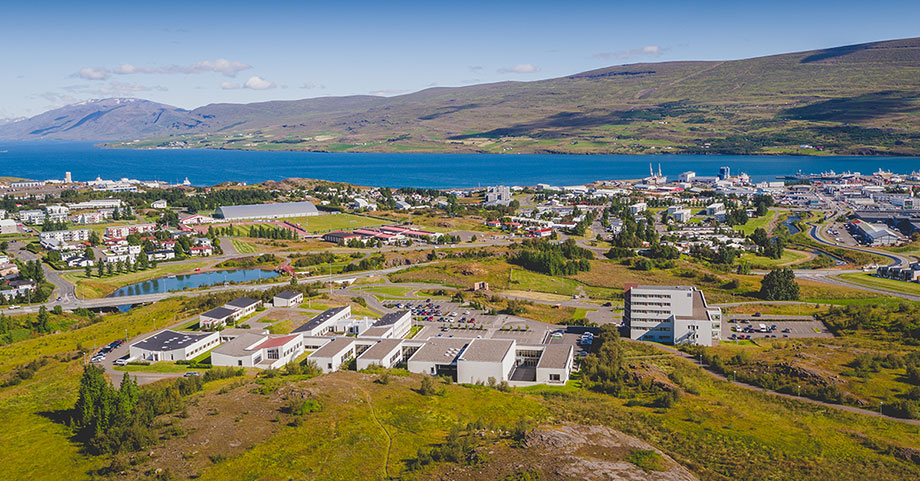
Committed to growing a green campus
Environmental affairs are a priority at the University of Akureyri. We aim high and our objective is to be fully carbon neutral by 2023.
The University of Akureyri is the first university in Iceland to achieve the Green Flag certification.
We at UNAK are implementing the Green Steps programme to reduce environmental impact from our daily operations.
- Make sure you’re in the loop! Follow the Environmental Council on Instagram and Facebook.
- Here is a video from the Environmental Council
We look forward to strengthening still further the environmental work of the university!
We recycle
Students, teachers and other staff members at the University are exemplary in regard to the environment. Everyone sorts their garbage and places it in specially marked trash bins.
There are eight categories:
- Paper and non-corrugated cardboard
- Returnable containers
- Plastic
- Cartons and paper cups
- General household refuse
- Organic household refuse
- Glass
- Metal
There are no trash bins in classrooms and meeting rooms. You simply take your garbage with you and dispose of it at the next sorting station.
The Green Flag certification
The University of Akureyri is the first university in Iceland to achieve the Green Flag certification, which is awarded for good environmental awareness. It was granted to the University at a formal ceremony on 16 September 2013. The University applied for the Green Flag certification for the fifth time in 2023.
The aims of the Green Flag certification scheme are the following:
- Improve the environment of the University and reduce waste and use of water and energy
- Enhance public spirit within the University
- Increase environmental awareness through education and projects inside and outside the classroom
- Strengthen democratic work methods in the management of the University when decisions are made in relation to students
- Provide students with education and skills to address environmental affairs
- Enhance international solidarity and language skills
- Connect the University to its community, businesses and the public
Green Steps

We at UNAK began preparation for taking part in the Green Steps programme in 2019 and completed all five steps in 2021.
Objectives and categories of the programme
The programme focuses on reducing environmental impact from the operations of the University and strengthening the environmental awareness of employees.
By participating in the Green Steps programme, we have the opportunity to carry out active environmental work in a systematic way. The programme is divided into five steps. Each step consists in around 20–40 measures that institutions must implement.
Objectives:
- Reduce environmental impact
- Strengthen environmental awareness of employees
- Increase wellbeing of employees and improve their work environment
- Reduce operating costs
Categories:
- Electricity and heating
- Transportation
- Waste sorting and waste reduction
- Procurement
- Meetings and events
- Communication and management
Green Teaching Award
The award is given to teachers who have integrated environmental protection into their courses.
2024
Antje Neumann, Associate Professor at the Faculty of Law. Antje gets the award for the course “Industries in the Polar Regions” and for the course “Enviornmental Law and Biodiversity”.
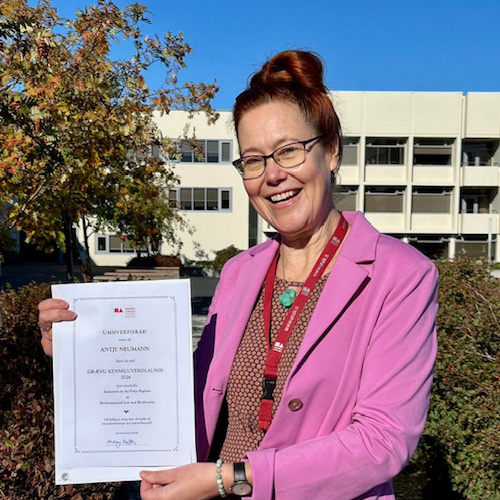
Jón Þorvaldur Heiðarsson, Assistant Professor at the Faculty of Business Administration. Jón gets the award for the course “Stjórnun og rekstur sveitafélaga”.
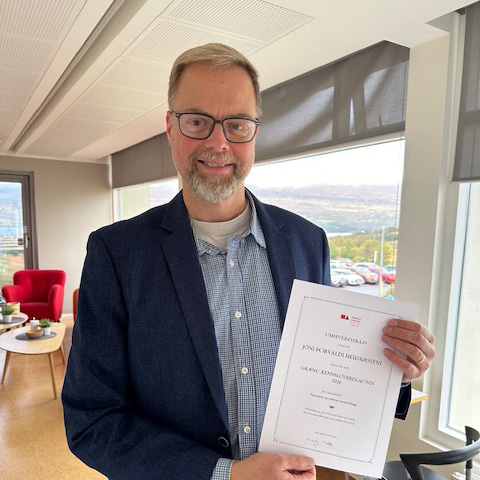
2023
Sara Fusco, a part-time teacher at the Faculty of Law. Sara gets the award for the course European Convention of Human Rights. Sara is a Ph.D. candidate at the University of Lapland, Faculty of Law, with research on the inclusion of Indigenous Peoples in Enviromental Constitutionalism in the Arctic. “I focus on how Arctic Constitutions are adapting to international Environmental Law and analyse how Indigenous communities and their cosmovision are involved in this global legal process,” Sara says.
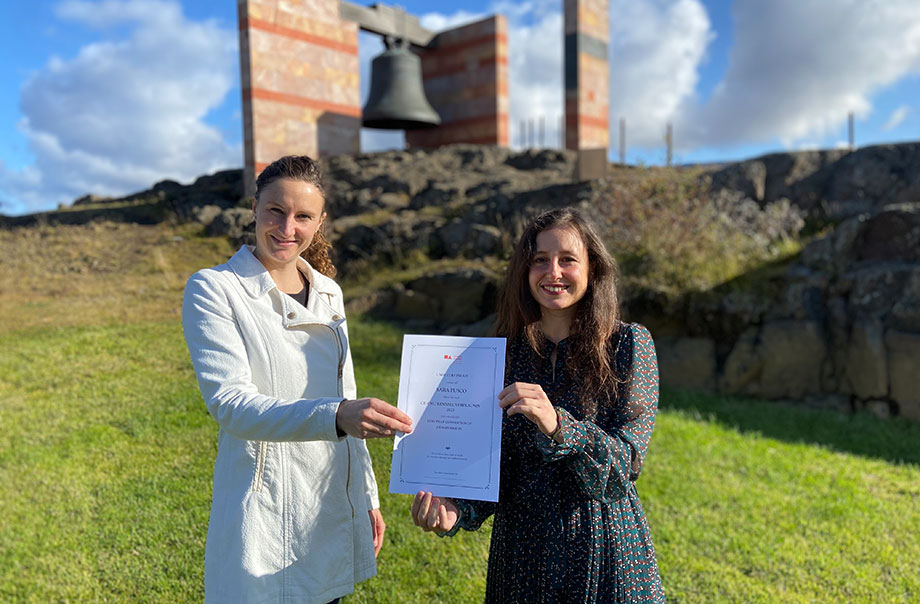
2022
Sean Michael Shully, adjunct in the Department of Natural Resource Sciences
Sean Michael Scully was awarded for his course Microbial Biotechnology (LÍÖ1106200). Sean is an adjunct within the Department of Natural Resource Sciences. His work mostly centers around the use of microorganisms and their enzymes for producing useful molecules from renewable materials. Microbial biotechnology is a third year undergraduate course that Sean co-teaches with Jóhann Örlygsson as a part of the Biotechnology study line. This course covers a wide-range of sustainability topics related to the use of microorganisms to produce molecules ranging from antibiotics, modified proteins, and industrial chemicals such as biofuels, and active pharmaceutical ingredients. A major topic within the class is the sustainable utilization of biomass as a raw material for cultivating microorganisms and as a starting material from which to make bio-based end products. As part of the course, students are required to undertake a project in which they convert a natural resource (such as grass, seaweed, or waste) into a useful biomolecule using microorganisms or enzyme systems.
Sólveig Zophoníasdóttir and co-applicants Áskell Örn Kárason, Bjarni Jónasson and Brynhildur Bjarnadóttir
Sólveig, Áskell Örn, Bjarni and Brynhildur receive awards for the courses Learning and work with information technology, Science in learning and play, Ethics, ideas and schools and Development theories, students and learning. In the study sessions of student teachers in the first year of teacher education, work is based on the theme of sustainability in all courses and the students work together in groups on projects related to sustainability under the guidance of teachers.
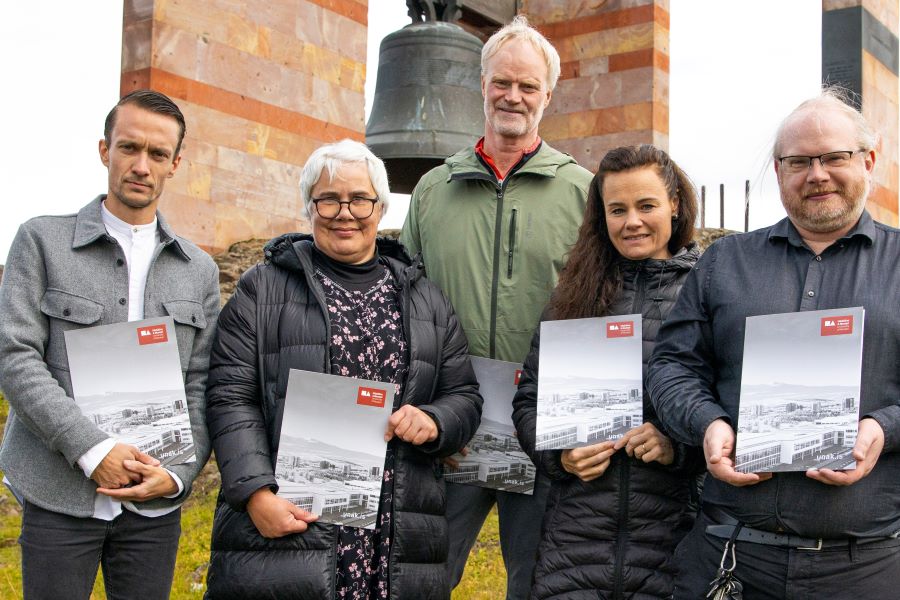
From left: Bjarni Jónasson, Sólveig Zophoníasdóttir, Áskell Örn Kárason, Brynhildur Bjarnadóttir and Sean Michael Scully.
2021
Brynhildur Bjarnadóttir, Associate Professor in the Faculty of Education
Brynhildur receives the award for her course Natural Science in Learning and Play. The course focuses on the concept of sustainability in a wide context. Students learn about the Earth’s ecosystem, sustainable ways of living and the impact they have on their environment. Through working on a project, students analyse their own attitudes, values and behaviour, in addition to examining their own consumer habits. Students also learn how to calculate their ecological and carbon footprint, work on ways of improvement and present ideas on changes to their own consumer habits to address the environmental and climate problems of the future. At the same time as they analyse their own lifestyle, students relate these subjects to educational work in preschools and primary schools and look at ways to work with the concepts at other educational levels.
Rachael Lorna Johnstone, Professor in the Faculty of Law
Rachael receives the award for the courses Introduction to Circumpolar Studies and Model Arctic Council. The course Introduction to Circumpolar Studies introduces students in Polar Law to various tools and methods to address the challenges of the Arctic, including climate change, pollution, biological diversity, tourism, use of natural resources and shipping. In the course Model Arctic Council, students communicate with other students in the Arctic on meetings of the Arctic Council and in simulated work, they, for example, negotiate collaborative measures to tackle environmental problems in the Arctic. The discussions this year were on marine plastic and protected areas.
Green Thesis Award
Umhverfisráð and Kennslumiðstöð want to increase the amount of green research among students. We want to honour students who include sustainability as a topic in their final theses. By conducting research in a sustainable way or even by incorporating sustainability topics into theses, we can make a difference.
2025
Natalia Ramirez Carrera. Natalia receives an award for the thesis “Can Lichens Serve as Hosts for Pseudomonas syringae in Icelandic Habitats? Isolation, Plant-pathogenic Traits, and Metabolomic Insights into the Role of P. syringae in Icelandic Peltigera Lichens”.
Renata Colwell. Renata receives an award for the thesis “To Honour Our Most Fundamental Relationship’: Exercising Gwich’in Rights and Responsibilities to Caribou in a Transboundary Context”.
Ásta Guðrun Birgísdóttir. Ásta receives an award for the thesis “Seasonality, Cognitive Vulnerability, and Safety Threat”.
Johanna Franke. Johanna receives an award for the thesis “Iceland’s commitment to clean beaches: a legal and policy analysis of strategies for marine litter reduction”.
2024
Eva Karen Guðrúnardóttir. Eva receives an award for the thesis Navigating the Climate Communication Landscape: Challenges Faced by Environmental NGOs in Competing with Media to Influence Public Understanding of Climate Change
Þuríður Elva Eggertsdóttir. Þuríður receives an award for the thesis Air pollution and Insomnia : The Relationship Between Particulate Matter and Insomnia, a Longitudinal Study based in Iceland
Birkir Freyr Sigurðsson. receives an award for the thesis Bílaleigur og Orkuskipti
Ísold Egla Guðjónsdóttir. Ísold receives an award for the thesis Redirecting phosphorus from wastewater: Screening for phosphate accumulating bacteria from clam guts for potential wastewater remediation applications
Garðar Kári Garðarsson. Garðar receives an award for the thesis Valorization of food waste. Microwave-assisted pectin hydrolysis for biofuel production
2023
Anna Kristrún Sigurpálsdóttir. Anna receives an award for the thesis The Relation Between Particulate Matter and Seasonal Fluctuations of Mood
Cayka Jean Asvestas. Cayla receives an award for the thesis Maximizing Growth Determinants of Clostridium isatidis for Enhanced and Sustainable Indigo Production
Eleni Kontostathi. Eleni receives an award for the thesis The Arctic Ice High Seas Marine Protected Area under the OSPAR Convention: Legal Complexities and Future Prospects
Jordane Liebeaux. Jordane receives an award for the thesis The No-Go Alternative: Rights of Nature and Ecocentrism in the Antarctic
Vera Ósk Albertsdóttir. Vera receives an award for the thesis Exploring the Potential of Aquaculture Rest Raw Materials for Carboxylic Acid Production Through Catalytic Oxidation: Towards Eliminating Waste
2022
Ásta G. Birgisdóttir. Ásta receives an award for the thesis SAD in the Summer
Ivan Nikonov. Ivan receives an award for the thesis Using macroalgal cultivation system in wastewater bioremediation: a case study of Bolungarvík, Iceland
Lisa Wrogemann. Lisa receives an award for the thesis Production of biodegradable Bioplastic based on PHA produced by bacteria isolates from Iceland
Oddur Einarsson. Oddur receives an award for the thesis Greining á kolefnisspori uppsjávarafurða
Pálína Björg Snorradóttir. Pálína Björg receives an award for the thesis Þjónustuupplifun Olís - uppfærsla vörumerkis og innleiðing
Salvör Káradóttir. Salvör fær receives an award for the thesis Biomass to carboxylic acids: A better route to sustainable chemical building blocks
Silja Hrönn Hlynsdóttir. Silja Hrönn receives an award for the thesis Microbial Production of Enantiomerically Pure 1,2-Propanediol
Særún Anna Brynjarsdóttir. Særún Anna receives an award for the thesis Rafrænt eftirlit - Innleiðing rafræns eftirlits í fiskveiðiflotann á Íslandi
Torfi Agnar Jónsson. Torfi Agnar receives an award for the thesis Þjónustuupplifun Olís - uppfærsla vörumerkis og innleiðing
Sustainability workshop at the University of Akureyri
The annual sustainability workshop at the University of Akureyri provides a forum for researchers and experts to exchange results, knowledge, and ideas on environmental research. A special emphasis lies on bringing together international partners, forging networks for future collaboration, and increasing interest among students by encouraging their active or passive participation.
The conference is held annually and is advertised in the university's calendar here on the web.